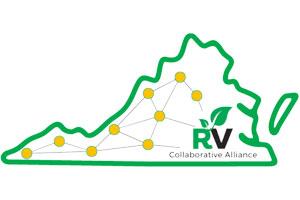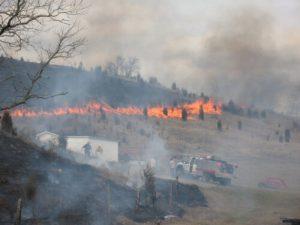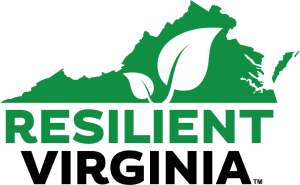Introducing the Resilient Virginia Collaborative Alliance (RVCA) –
Resilient Virginia’s regional resilience initiative in Central and Southwest Virginia

What is a Regional Collaborative?
 A regional collaborative is simply the aggregation of cross-regional stakeholders for a common cause. Intentional, well-organized collaboratives help alleviate the strain of limited local government capacity; foster cross-sector interaction and understanding; and augment finite financial and technical resources.
A regional collaborative is simply the aggregation of cross-regional stakeholders for a common cause. Intentional, well-organized collaboratives help alleviate the strain of limited local government capacity; foster cross-sector interaction and understanding; and augment finite financial and technical resources.
For the past two years Resilient Virginia has researched the benefits of regional collaboratives, simultaneously working with Virginia Tech Executive Master of Natural Resources graduate students to perform needs assessments for the region; checking in with local and regional governments about their needs and gaps in capacity and resources; and joining working groups within the American Society of Adaptation Professionals (ASAP) and Georgetown Climate Center to learn from those who have built collaboratives. As a result of this research and discussion we determined that communities in the central and southwest part of the state would highly benefit from a regional collaborative.
Why Build a Collaborative for Central and Southwest Virginia?
 Our communities are being impacted by increasing numbers of disasters, such as recent wildfires that have burned across the state; drought that much of the state is currently experiencing; and massive flooding that devastated areas in central and southwest Virginia over the past couple of years. Typically, rural communities struggle with adequate responses to these disasters due to staffing and funding limitations. And though funding opportunities from federal and state programs are plentiful (at the moment), the application process is often overwhelming and has quick deadlines which hinder local governments and community based organizations from applying.
Our communities are being impacted by increasing numbers of disasters, such as recent wildfires that have burned across the state; drought that much of the state is currently experiencing; and massive flooding that devastated areas in central and southwest Virginia over the past couple of years. Typically, rural communities struggle with adequate responses to these disasters due to staffing and funding limitations. And though funding opportunities from federal and state programs are plentiful (at the moment), the application process is often overwhelming and has quick deadlines which hinder local governments and community based organizations from applying.
The state has also historically focused on coastal resilience and we’re happy to say that much progress has been made. However, the needs and priorities of non-coastal communities differ from coastal communities. Because of this, communities in Central and Southwest Virginia would benefit from intentional discussion and problem solving related to non-coastal needs and priorities with others who are going through the same challenges they are. Through collaboration, our rural and inland communities can collectively identify priority concerns; have a robust unified voice at the regional level; and accomplish more by working together. This will increase opportunities for funding revenue and boost local capacity.
Resilient Virginia's Role
 In order to centralize outreach and action, collaborations need a foundational backbone. Since 2014, Resilient Virginia, a nonpartisan, nonprofit organization, has facilitated relationships between government, nonprofit, business, community, academia, and private sector entities to achieve collective impact. Our experience with this work and our strong, lasting relationships with these groups puts us in a place to take on this role and as the backbone organization of the RVCA, we commit to:
In order to centralize outreach and action, collaborations need a foundational backbone. Since 2014, Resilient Virginia, a nonpartisan, nonprofit organization, has facilitated relationships between government, nonprofit, business, community, academia, and private sector entities to achieve collective impact. Our experience with this work and our strong, lasting relationships with these groups puts us in a place to take on this role and as the backbone organization of the RVCA, we commit to:
- Establish a common vision and strategic direction with guidance from the Core Steering Committee;
- Guide data collection, analysis, and reporting;
- Support aligned activities that educate and motivate;
- Facilitate working group formation based on expressed priorities;
- Build public capacity to understand challenges;
- Advance policy to facilitate actionable solutions; and
- Mobilize funding for localities.
RVCA Structure
Core Steering Committee: We are currently assembling the RVCA core steering committee. This cross-sector committee will help us define regional needs; assist in developing the governance structure; assist in approving the mission, goals, and objectives of the collaborative; and identify the first set of Working Groups.
Working Groups: Working groups will be a space where small groups of local governments, community-based organizations, businesses, and academic institutions can meet for peer exchange and to develop program proposals, action plans, strategies, and/or best practices on a predetermined topic.
Leadership Advisory Council: Once the basic structure and strategic plan for the RVCA is established, the leadership advisory council will serve as advisors, providing technical expertise and advice on issues related to the collaborative.
Get Involved
We invite you to let us know how the Regional Collaborative for Central and Southwest Virginia could best serve you and your community, organization, or business. If you are interested in getting involved as a Core Steering Committee member or as a Funding Partner, or have comments and suggestions, contact Brendle Wolfe – RVCA@ResilientVirginia.org.
Resilient Virginia launched the Collaborative Alliance while participating in the Urban Equity Climate Compact (UECC), a cohort based program run by the Institute for Sustainable Communities (ISC) and funded by the Kresge Foundation. ISC has been instrumental in the development of many regional collaboratives around the U.S. so we are excited to participate in this program. Our time in the UECC cohort runs through May 2024.




